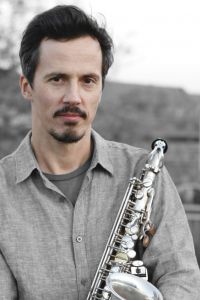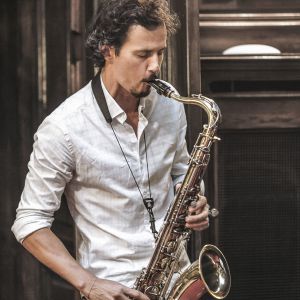A health-related setback towards the conclusion of his studies transformed the life of this full-blooded musician from the ground up. A subsequent decision to begin doing volunteer work then led him to train in grief counselling and end-of-life care at the Kardinal König Haus. And today, he facilitates networking among amateur musicians with his platform Connect4Music.
It was early in life that Johannes Mayrhofer, who grew up on a farm in the district of Amstetten, came into contact with music. His grandfather and great-uncle were both passionate folk musicians and organised regular music-making get-togethers. “My family’s circle of friends met at our place, made music, and had fun. That made an huge impression on me, back then, and I felt drawn to it. I really wanted to join in,” remembers the Lower Austrian native. “Music was constantly present at our place in everyday life, too. My parents both played in the local brass band, and two of my three brothers also learned to play an instrument.” He was especially impressed, though, by his grandfather and great-uncle, both of whom were multi-instrumentalists. “My great-uncle played the steirische Harmonika and the flugelhorn, while my grandfather played clarinet, violin, zither, and organ. It fascinated me how a person could switch between several instruments.”

In keeping with the family tradition, playing in a brass band would remain his goal for a long time. Following three years of recorder lessons, the young musician switched to clarinet and taught himself to play saxophone on the side. And at age 13, Johannes Mayrhofer was—as he puts it—“fit for the local band”. “I was quite satisfied with that, at first; studying at the university level wasn’t initially a topic.”
At our place, music was constantly present in everyday life.
Only when this committed musician did his compulsory military service with a military ensemble did his view of things begin to change. “The military band opened up my horizon. I got to know musicians there who were preparing to study music or had even already studied it. For me, that was completely unknown territory at first. The idea of making my living with music or studying music had never before entered my world of experience.” Only as the young saxophonist’s time with the military ensemble drew to a close, with his return to the work he’d been trained for—as a machinery installer—fast approaching, did he decide to go back to school: “I’m passionate about working with my hands, but I didn’t want to do that job my entire life long.” Thanks to a three-year contract with the military ensemble Militärmusik Niederösterreich, Johannes Mayrhofer received the opportunity to earn an evening school Matura and put in sufficient practice on his instrument. And after just two years, he registered to take the entrance examination at the mdw and passed on his first attempt.
I’m glad I studied at the mdw and got this training as an educator, because I’ve now become passionate about teaching.
2001 saw him begin studying music education with a focus on saxophone in popular music and a minor in flute. “Becoming a teacher wasn’t the initial motivation behind that, even though I do love teaching today,” explains the dedicated teacher: “I just wanted to get as good as possible and perform onstage.” But things didn’t turn out as planned. While preparing to take the final examination to earn his Magister, the young musician suffered a severe setback: his soft palate gave out, causing an air leak that prevented him from producing enough pressure to make a sound on his instrument. “Suddenly, everything was in question. I found myself in a situation where I could no longer play for more than half an hour. Which, it was clear to me, is insufficient for the theatre or the stage. I could still teach, but I began questioning my existence as an active musician from the ground up.”
My volunteer work at the palliative care unit never fails to bring me back to the here and now. It’s a gift to the people there and to myself.

During a break in the Swiss Alps, Mayrhofer got the urge to take up volunteer work as a way of balancing out his everyday life as a music teacher. And as he began researching his options, he hit upon a preparatory course on the topic of grief counselling and end-of-life care at Kardinal König Haus. “They initially wait-listed me, but after a few days I was informed that someone else had bowed out and I’d be able to begin. I thought to myself that if it was that easy, it was the right way to go.” After he’d completed this course, Johannes Mayrhofer began doing volunteer work in the palliative care unit of the hospital Krankenhaus Göttlicher Heiland and also paid home visits to patients as a team member of the mobile hospice care service run by Caritas. “At first, I did that one day a week. But at present, with a family and my teaching work, I’m unfortunately only managing to get to the hospital once every month or so. It is very important to me, though, and I don’t want to give it up.” His responsibilities as a volunteer go beyond talking with the people receiving care to include serving food, helping with other care tasks, and even doing technical jobs. “The main thing for me is to support the professional team so that they can work well and spend as much time as possible with the patients. So for anything they need help with, I’m there.” Accompanying people in the palliative care unit on their final steps through life is something that Mayrhofer describes as arriving in the here and now, something that shows him what’s important in life in the moment. “It’s a gift to the people there and to me, as well as to the employees working there—so it’s what you might call a win-win-win situation!”
I’d like to introduce people to the joy of making music together with others.
The fact that Johannes Mayrhofer truly cares about supporting his community is demonstrated by his newest project: “Connect4Music” is an online platform that this passionate educator developed to help amateur musicians network with like-minded people in order to make music together. “From my work as a music teacher, I know that a lot of my music students want to play together with others but don’t know how to find somebody. That inspired me to develop Connect4Music.” And as an experienced educator, Mayrhofer also offers music coaching and provides useful tips and tricks. “Some amateur musicians aren’t sure whether they’re advanced enough to make music in a group. Others don’t know exactly how they should get started. So in our coaching sessions, I support them in realising their musical wishes and help bring together suitable partners.” Several motivated musicians have already found each other through this platform, and they’re now letting its founder in on their initial successes. “Everyone who’s interested is warmly welcome—regardless of age, skill level, musical style, or instrument!”

